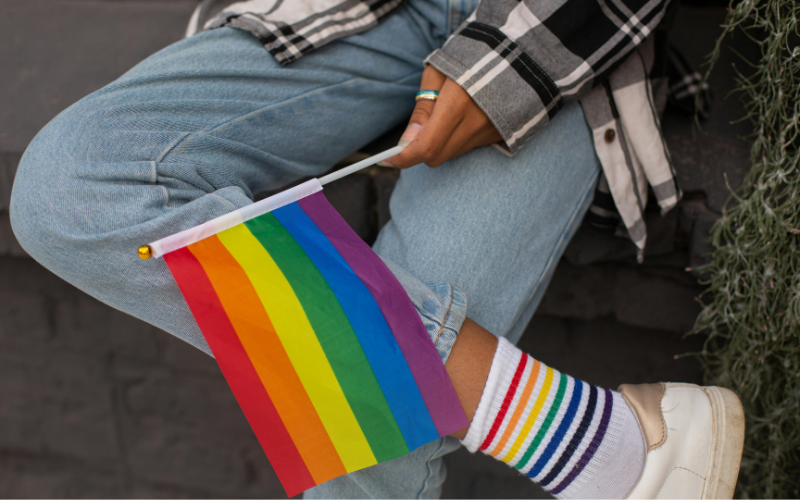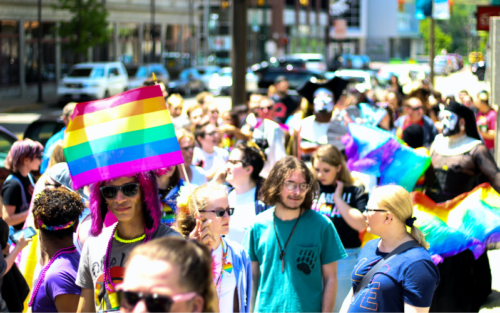
Diversity and inclusion are vital for young people to feel represented during RSHE classes. The Sex Education forum summarise perfectly the importance of youth voice in RSE in their Young People’s RSE Poll 2024. They say that ‘Asking young people about their experiences of RSE and their views on how it can be improved is a basic starting point for designing and delivering effective, engaging and inclusive curricula”.
Why Diversity and Inclusion are Needed in RSHE
In February 2024, The Sex Education Forum carried out a poll of young people aged 16-17 who attend school in the UK. The results show there has been a lot of positive progress in the last few years since the statutory requirements were introduced. One positive takeaway is that 61% of students agreed that RSE taught them useful skills for consent in relationships.
However, some of the statistics are evidence that more still needs to be done to ensure young people feel represented and included by RSE because there are still worrying disparities.
Only 43% of students feel personally represented and included by the RSE they receive at school. Meanwhile, 38% of respondents identifying as lesbian, gay, bisexual, queer, or questioning rated their RSE as ‘good’ or ‘very good’ compared with 52% of those identifying as straight. 18% of respondents identifying as lesbian, gay, bisexual, queer, or questioning rated their RSE as ‘bad’ or ‘very bad’ compared with 10% of those identifying as Straight.
It’s crucial that we provide a space for all young people to develop skills to have healthy lives and relationships and this will only be achieved if young people are engaged, listened to and consulted to make sure they are receiving the education that is most relevant to them. This should be a particular focus for LGBTQ+ students given the disparity in experiences that still exist today.
How can we make sure we support LGBTQ+ inclusion in schools?
- Implement Inclusive Policies
- Gender Inclusive Facilities
- Curriculum and Resources
- Staff CPD
- Family Engagement
- Visability
- Youth Voice and Support
Implement Inclusive Policies
Schools should have clear policies that prohibit discrimination and harassment for all students including based on sexual orientation, gender identity, and gender expression. All students and staff should be aware of the consequences of this type of behaviour due to it being clearly documented in the school’s behaviour policy. Any incidents of discrimination should be clearly logged by staff members to ensure the correct interventions can happen in a timely manner and support can be given to students involved.
Gender-Inclusive Facilities
Having access to gender-neutral bathrooms ensures that all students have a safe and comfortable environment. Consider how to manage changing rooms for P.E should there be gender diverse students at your school for example having access to single-person changing rooms will support these students in particular to feel safe and respected.
Curriculum and Resources that Promote Inclusion and Diversity
LGBTQ+ topics should be integrated into the curriculum across all subjects rather than being taught just as standalone lessons. This can include teaching about LGBTQ+ history, literature, and significant figures in a variety of subjects. Consider whether your school library is representative of your young peoples’ experiences and make sure there are books and resources that feature LGBTQ+ people and reflect their experiences.
Staff CPD on Inclusion and Diversity
Staff should be provided with regular training for all staff on LGBTQ+ inclusion, such as how to create inclusive classrooms, how to manage bullying and behaviour concerns and how to support LGBTQ students should they need a safe space to talk to a trusted adult. It’s crucial that this training isn’t just for teaching staff. All members of staff, from the school site team through to reception need to feel confident on challenging behaviour and supporting all students.
An important part of supporting students to feel safe in school is creating safe spaces within lessons to facilitate meaningful discussion. Discussion based learning in lessons such as RSHE is a really good tool to educating students on other peoples’ experiences and allow them a space to voice their questions and increase their empathy and understanding for others. It’s crucial that this is sensitively handled so training staff to create safe spaces to facilitate discussion should be a priority so that behaviour is managed and students feel confident to get involved.
Furthermore, it’s important that all staff feel confident around the use of inclusive language and are kept up to date with any changes. Having a consistent approach across the school is a great way to support healthy-school culture and ensure students feel safe.
Family Engagement
Supporting LGBTQ+ inclusion in schools involves actively engaging parents and carers. Schools can provide resources, host drop-in sessions and/or offer workshops to help parents and carers understand LGBTQ+ and the importance of creating a supportive environment within schools for all students. A key way to do this is by highlighting the benefits of inclusion, such as improved mental health and academic outcomes for all students. By fostering a collaborative environment amongst parents, these key messages are more likely to filter down to the students themselves if they recognise that schools and parents are working together. It’s important to be as transparent with parents as possible about things such as your RSHE curriculum and why this is an important subject to champion empathy and kindness. Life Lessons have a parent page to support schools with this crucial communication.
Visibility
Although LGBTQ+ topics should be interwoven into your regular curricula, it’s also important to recognise and celebrate LGBTQ+ events such as Pride Month, Transgender Day of Visibility, and National Coming Out Day to promote awareness and acceptance. If there’s the option, inviting in LGBTQ+ role models and/or speakers can really help to bring to life their experiences and inspire your students, whether they belong to this community or not.
Celebrating things such as Pride Month can surface some challenging questions from students such as ‘Why is there not a straight month?’. Supporting all staff to be equipped to manage these questions in an informative and non-judgemental way would help to give students clear, consistent messages about the importance of these awareness events.
Read our blog on 5 Top Tips for Delivering Lessons on Pride and the LGBTQ+ Community.
Youth Voice and Support
Youth voice is often organised through a student council and it can be great to see students giving their opinions on everything from policies through to extra-curricular activities. However student councils are not always representative of the whole student body so extra effort must be made to ensure we are hearing from all voices. Consider having an LGBTQ+ specific youth group that could serve to gather students’ opinions on important topics but also as a support group for those needing a safe space or advice. Peer mentor systems can be really effective in providing additional support, particularly to young students so consider creating a safe space for this to happen and upskilling some of your students to support their peers.
Creating a school environment that is inclusive of LGBTQ+ students is not only essential for their well-being and success but also supports the entire school community. By implementing inclusive policies, CPD, support structures, curricula and parent engagement, schools can ensure that all students feel safe, respected, and valued leading to a healthier school culture and positively impacting safeguarding.



